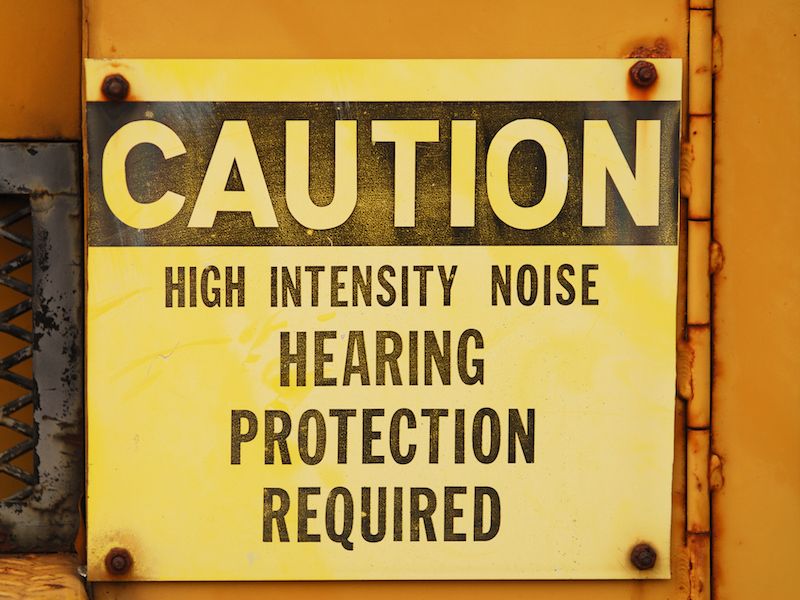
It’s one thing to know that you should safeguard your hearing. Knowing when to safeguard your ears is a different story. It’s harder than, for instance, knowing when you need sunblock. (Is it sunny and are you going to be outside? Then you need sunblock.) It isn’t even as simple as knowing when to use eye protection (Using a hammer? Cutting some wood or working with hazardous chemicals? Use eye protection).
It can feel as though there’s a huge grey area when addressing when to use ear protection, and that can be dangerous. Unless we have particular information that some place or activity is dangerous we tend to take the easy path which is to avoid the problem altogether.
A Tale of Risk Analysis
In general, we’re not very good at assessing risk, especially when it comes to something as intangible as injury to the ears or the risk of lasting sensorineural hearing loss. To demonstrate the situation, here are some examples:
- Person A attends a very loud rock concert. The concert lasts approximately 3 hours.
- A landscaping business is run by person B. She spends a considerable amount of time mowing lawns, then she goes home to a quiet house and reads a book.
- Person C is an office worker.
You may presume that person A (let’s call her Ann, to be a little less clinical) might be in more hearing danger. Ann leaves the show with ringing ears, and she’ll spend most of the next day, trying to hear herself talk. Presuming Ann’s activity was risky to her ears would be reasonable.
Person B (let’s just call her Betty), on the other hand, is subjected to less noise. Her ears don’t ring. So it has to be safer for her ears, right? Not really. Because Betty is mowing every day. So even though her ears don’t ring out with pain, the harm builds up gradually. If experienced too often, even moderately loud noises can have a harmful affect on your ears.
What’s occurring with person C (let’s call her Chris) is even more difficult to sort out. Most individuals understand that you should safeguard your ears while using equipment like a lawnmower. But although Chris has a relatively quiet job, her long morning commute on the train each day is rather loud. Also, while she works at her desk all day, she listens to her music through earbuds. Does she need to consider protection?
When You Should Worry About Protecting Your Ears
The standard guideline is that if you have to raise your voice to be heard, your environment is loud enough to do harm to your hearing. And you should think about wearing earplugs or earmuffs if your environment is that noisy.
If you want to think about this a little more scientifically, you should use 85dB as your limit. Noises above 85dB have the potential, over time, to lead to injury, so you should think about wearing ear protection in those situations.
Your ears don’t have their own sound level meter to alert you when you get to that 85dB level, so countless hearing professionals recommend downloading specialized apps for your phone. These apps can inform you when the surrounding sound is nearing a dangerous level, and you can take proper steps.
A Few Examples
Your phone might not be with you anywhere you go even if you do download the app. So we might formulate a good baseline with a couple of examples of when to protect our ears. Here we go:
- Listening to music with earbuds. This one requires caution, not protection. Whether your music is playing directly into your ears, how loud it is playing, and how long you’re listening to it are all things you should give consideration to. Consider using headphones that cancel out outside sound so you don’t need to turn up the volume to hazardous levels.
- Exercise: Your morning spin class is a good example. Or maybe your daily elliptical session. All of these cases might require hearing protection. The high volume from trainers who play loud music and microphones for motivation, though it may be good for your heart rate, can be bad for your ears.
- Commuting and Driving: Spending all day as an Uber or Lyft driver? Or maybe you’re just hanging out downtown for work or getting on the train. The constant noise of living in the city, when experienced for 6-8 hours a day, can cause damage to your ears over the long term, especially if you’re cranking up your music to hear it over the commotion.
- Working With Power Tools: You know that working every day at your factory job is going to call for hearing protection. But how about the enthusiast building in his garage? Even if it’s just a hobby, hearing specialists suggest using hearing protection if you’re utilizing power equipment.
- Every day Chores: Even mowing a lawn, as previously mentioned, calls for hearing protection. Cutting the grass is a great illustration of the type of household task that may cause damage to your ears but that you most likely won’t think about all that often.
A good baseline might be established by these examples. When in doubt, though, you should choose protection. Instead of leaving your ears exposed to future damage, in most circumstances, it’s better to protect your hearing. If you want to be able to hear tomorrow, protect today.
